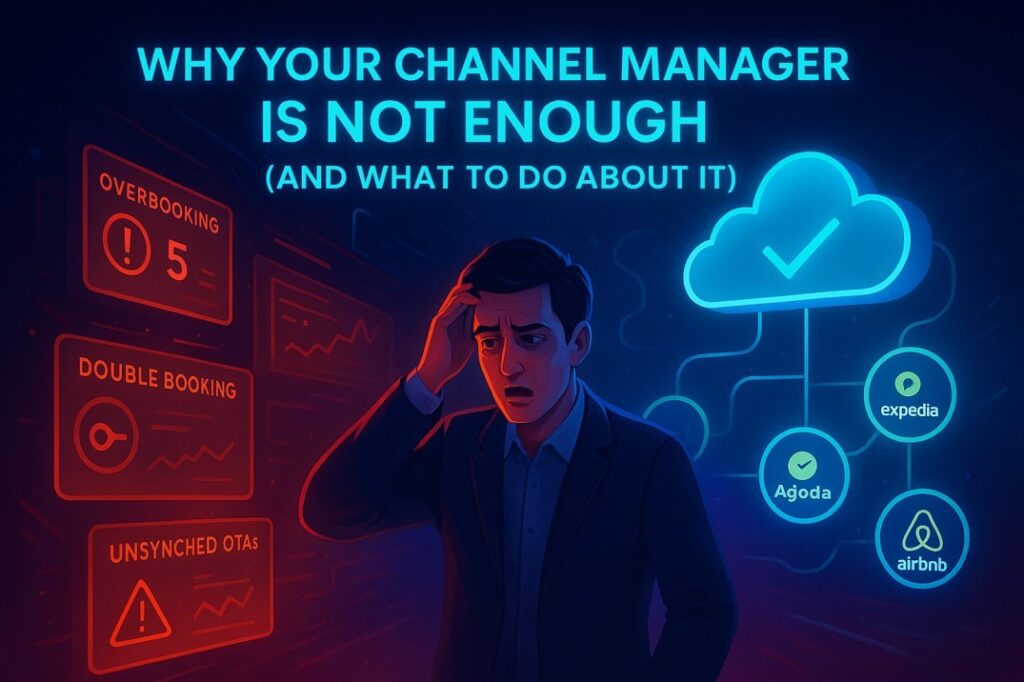In 2025, hotel operations have gone far beyond simply listing rooms on online travel agencies (OTAs). While channel managers are still essential for managing OTA distribution, relying on them alone is no longer enough to stay competitive, increase revenue, or deliver outstanding guest experiences.
If you’re still depending solely on a channel manager to run your hotel’s digital distribution, you’re leaving opportunities—and money—on the table.

In this in-depth guide, we’ll explain:
- Why a channel manager alone won’t cut it anymore
- The hidden limitations of standalone channel managers
- What tools you need to build a complete hotel tech stack
- How to optimize operations, reduce costs, and grow revenue
- FAQs and a detailed comparison table to help you make the right decisions
✅ What Does a Channel Manager Do? (Quick Recap)
A hotel channel manager is software that connects your hotel to multiple online booking platforms (OTAs), ensuring your room availability and rates are synced in real time across all connected channels.
| Key Functions of a Channel Manager |
|---|
| Connects hotel to OTAs, GDS, and booking engines |
| Synchronizes room availability and pricing |
| Reduces risk of overbookings |
| Centralizes OTA reservations |
| Helps with rate parity enforcement |
These are crucial functions, but they only solve one part of the hotel operations puzzle.
🚫 Why Your Channel Manager Is Not Enough in 2025
1. It Doesn’t Manage the Guest Experience
Guests expect personalized, seamless experiences from pre-booking to post-checkout. A channel manager can’t:
- Send pre-arrival emails or messages
- Collect guest preferences
- Automate in-stay feedback
- Manage post-stay follow-ups or loyalty programs
📌 You need a CRM (Customer Relationship Management) or guest engagement platform for this.
Most channel managers don’t support:
- Check-in/check-out processes
- Room assignments
- Billing and folio management
- Guest identity verification
📌 You need a Property Management System (PMS) to manage on-site operations.
3. It Lacks Direct Booking Capabilities
Channel managers are OTA-focused. They don’t offer:
- Commission-free bookings from your website
- Integration with Google Hotel Ads or meta search
- Special pricing for returning guests
- Promo codes or upsell offers
📌 A booking engine is essential for capturing direct reservations.
4. No Support for Dynamic Pricing
Your channel manager might allow rate updates, but it doesn’t:
- Analyze competitor rates
- Monitor market demand
- Apply automated pricing rules
📌 You need a Revenue Management System (RMS) for intelligent, dynamic pricing.
5. No Financial or Operational Reporting
Most channel managers offer only OTA performance stats. You won’t get:
- Total revenue breakdown
- Profitability by channel or room type
- Departmental or operational analytics
- Forecasting or budgeting tools
📌 Use a PMS or Business Intelligence tool for deeper reporting.
6. No Automation for Staff Tasks
Channel managers don’t automate:
- Housekeeping schedules
- Maintenance tickets
- Staff task assignments
- Internal communications
📌 Integrate with PMS or hotel operations platforms for full control.
🔧 The Missing Pieces in Your Hotel Tech Stack
| Function | Tool Needed | Why It Matters |
|---|---|---|
| Guest Experience | CRM | Personalizes communication and increases loyalty |
| On-site Operations | PMS | Central hub for check-in, housekeeping, and billing |
| Direct Bookings | Booking Engine | Increases profit by reducing OTA commissions |
| Smart Pricing | RMS | Helps maximize occupancy and revenue |
| Marketing | Email/Automation Tools | Drives repeat business and upsells |
| Finance & Reporting | BI Tools | Improves forecasting, budgeting, and planning |
💡 What You Should Do Instead: Build a Connected Tech Stack
Relying only on a channel manager is like using only email for running an entire hotel—it’s outdated and inefficient.
Step-by-Step: What to Add to Your Setup
| Step | Add This | Benefit |
|---|---|---|
| Step 1 | Property Management System (PMS) | Handles check-ins, billing, and room assignments |
| Step 2 | Booking Engine | Boosts direct bookings and reduces dependency on OTAs |
| Step 3 | Revenue Management System (RMS) | Optimizes rates in real time based on demand |
| Step 4 | CRM or Guest Engagement Tool | Builds loyalty and personalizes guest experience |
| Step 5 | Integrated Payments | Simplifies accounting and ensures secure transactions |
| Step 6 | Business Intelligence Dashboard | Allows better decisions based on real-time data |
| Feature | Benefit |
|---|---|
| Seamless Data Flow | All systems talk to each other—no more duplicate entry |
| Better Guest Experience | Personalized, smooth, and consistent interactions |
| Higher Profit Margins | Direct bookings, optimized pricing, reduced labor costs |
| Improved Efficiency | Staff spend less time on repetitive tasks |
| Real-Time Insights | Make informed decisions with up-to-date data |
| Scalable for Growth | Easily manage multiple properties or new locations |
1. Isn’t a channel manager enough for a small hotel?
Not anymore. Even small hotels face high competition. Without tools for direct bookings, guest engagement, and rate optimization, you’re missing key revenue opportunities.
2. What happens if I rely only on a channel manager?
You risk overpaying commissions, delivering poor guest experiences, missing out on data-driven pricing, and losing control over your brand and profit margins.
3. How does a PMS differ from a channel manager?
A PMS manages internal operations like check-ins, billing, and housekeeping. A channel manager handles external OTA distribution. They complement each other but serve different purposes.
Modern SaaS tools are modular and scalable. You can start small (e.g., PMS + channel manager) and add more tools as your operations grow. The ROI is often worth the investment.
Yes, many hotel tech platforms offer open APIs or come pre-integrated. Using integrated solutions reduces errors and ensures smooth operations.
Use a booking engine on your hotel website, offer exclusive discounts, build email campaigns, and use Google Hotel Ads or meta search engines to drive traffic.
7. Does a channel manager help with pricing strategy?
Only at a basic level. For dynamic pricing and demand-based strategies, you need a Revenue Management System (RMS).
8. What’s the biggest risk of relying only on a channel manager?
Over-dependence on OTAs, higher commission costs, poor guest relationships, and lack of control over pricing and inventory strategies.
Final Thoughts: Time to Upgrade Beyond Just a Channel Manager
In 2025, a channel manager is just the beginning. While it’s a valuable part of your distribution strategy, it can’t handle operations, pricing, guest relationships, or direct sales on its own


